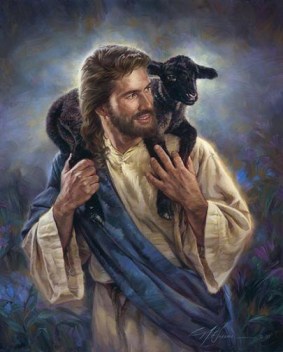29. All & Fall
All of us like sheep have gone astray, each of us has turned to his own way; but the LORD has caused the iniquity of us all to fall on Him. (Isaiah 5:6)

There are times when generalizations are used, and we need to take them seriously. When Isaiah says all here, he means all. Recall the familiar passage in Romans: As it is written, “There is none righteous, not even one; there is none who understands, there is none who seeks for God; all have turned aside, together they have become useless; there is none who does good, there is not even one. Their throat is an open grave, with their tongues they keep deceiving, the poison of asps is under their lips; Whose mouth is full of cursing and bitterness; their feet are swift to shed blood, destruction and misery are in their paths, and the path of peace they have not known. There is no fear of God before their eyes.” ( Romans 3:10-18) Just as in Isaiah where all means all, in Romans, none means none.
All is a common word in the Old Testament, used over 5300 times. All is the most common of its translations, but other occurrences include: any, every, everyone, everything, whoever, whatever, and whole. Are we getting a sense of inclusiveness here? The iniquity of us all. Anyone and everyone who will come to Christ, He has already taken your sins upon Himself. As the old hymn goes: There is room at the cross for you. There are none saved, who have not had their sins taken away by the Son of God.
We must not miss the convergence here. Where as all of the iniquity of us all is dispersed amongst all of mankind, here it is focused upon The One. For Christ in His humanity to take upon Himself the iniquities of us all—and that doesn’t just mean those who existed at the time of His death; no, it means that everyone at any time throughout history past and history yet to come, every sin fell upon Him—that would be utterly overwhelming.
Fall upon can have a deadly meaning, and in most cases, the result of being fallen upon is actually to be killed. It can also mean intercede, and it is used as a geographical term regarding borders reaching or meeting one another. Christ did indeed intercede for us on the cross, and having our sins fall upon the Him had deadly consequences; but consider this as a geographical term. Heaven came down to earth, met sin, then took it upon Himself. Returning to the primary meaning, this meeting was deadly. Sin didn’t just fall; it fell on Him. Imagine the picture, of all the sins of mankind rushing down upon Christ, as an enemy would rush upon a foe, with so much violence and ferocity so as to completely devastate.
We must not think this was an exercise in gravity or magnetism; that all the evil in the world that was, and is, and is to come, was mindlessly attracted to Him. Neither should we think this was the work of the devil. No, this was the work of the Father, who caused the focus and unleashed the fall. I’m not sure we will ever understand what this did to The Father, what He was feeling and thinking; but we do know why He did it. It was for you.
Note where this comes in the chapter. Isaiah has just listed off the six substitutions of mercy and grace that only Christ could accomplish; and then—here it comes—All of us like sheep have gone astray. So immediately following the ultimate act of love and sacrifice, we wander off! Now I could see the Father becoming a bit ticked by that, as we turn from the greatest act of love ever done in the universe. But what does He do? He caused the iniquity of us all to fall on Him. Look behind the cross and see in the Father the same love for you which the Son had for you.


 Years ago, I heard a preacher—I don’t know if it was live or on the radio— who talked about the choices we make and the paths we take. So there you are, walking along with God, side by side, fellowshipping with Him, following Him, just being WITH Him. And then you decide to take a right turn, and go off in your direction. Now this is not without biblical precedence.
Years ago, I heard a preacher—I don’t know if it was live or on the radio— who talked about the choices we make and the paths we take. So there you are, walking along with God, side by side, fellowshipping with Him, following Him, just being WITH Him. And then you decide to take a right turn, and go off in your direction. Now this is not without biblical precedence.